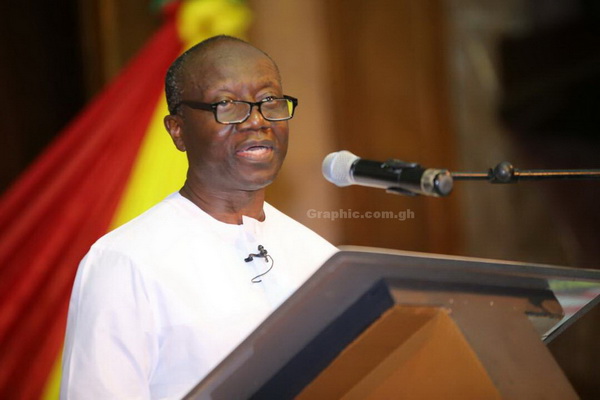The Minister of Finance, Mr Ken Ofori-Atta, has stressed the country’s commitment to pursue a more strategic aid mobilisation and management approach that fully aligns with its development priorities and programmes within the economy.
He explained that ‘Ghana Beyond Aid’ did not mean the country would turn its back on foreign aid from its development partners.
Mr Ofori-Atta was speaking at the Ghana-German Economic Association (GGEA) Business Forum held in Accra last Wednesday.
“We will continue to welcome development assistance; however, we will be more strategic in how we mobilise and manage it,” he said, adding that in particular aid had to be firmly aligned to economic and social development priorities developed by Ghana for itself.
He said Ghana had seen the role foreign aid played in the Japanese Miracle or the Marshall Plan in 1948, adding that even the majority of European Union (EU) countries depended on the EU for support.
Mr Ofori-Atta said the government would also aggressively promote private investment, both domestic and foreign, and radically improve the business environment in the country.
Given the enormity of the resources required for our rapid economic transformation, he said, the government would intensify its efforts at raising foreign private investments, venture capital and private equity firms, institutional investors and sovereign wealth funds.
The Finance Minister said the government would also rigorously increase the efficiency of resource use in the public sector and significantly increase resource mobilisation, which would involve increasing private savings and government revenues.
“And we will ensure that resources to the public sector are properly deployed and efficiently monitored to ensure value-for-money,” he added.
Strategic programmes
Under the guidance of President Nana Addo Dankwa Akufo-Addo, he said, the government was working towards translating the ‘Ghana Beyond Aid’ vision into specific policies, reforms, processes and strategic investment programmes which would be announced soon by the President.
The process of transformation, he noted, would require the government to be an activist government, be pragmatic and, in a sense, dual track.
“We have to play an enabling role and be deliberate in promoting Ghanaian entrepreneurs to team up with their German and foreign partners,” he stressed.
Mr Ofori-Atta noted that there was more than $10 trillion invested in negative interest rate bonds, $24 trillion in low-yield government securities and $5 trillion sitting in cash, waiting for better investment with higher returns.
That, he noted, clearly demonstrated the importance of the Compact with Africa launched last year under the leadership of Germany.
German Envoy
The German Ambassador to Ghana, Mr Christoph Retzlaff, recalled a visit by the German President, Mr Frank-Walter Steinmeier, to Africa, his first to Africa, during which period the joint reform partnership was signed.
He said the accompanying support measure under the G20 Compact with Africa brought 100 million Euros to Ghana, predominantly for renewable energy and vocational training.
The Ambassador was happy to note that the German President travelled with a high-ranking business delegation which signed a memorandum of understanding (MoU) or investments in Ghana to the tune of about 700 billion Euros.
He recalled the visit by President Akufo-Addo to Berlin on his first trip to Europe when he attended the G20 Africa Summit and signed the G20 Compact with Africa.
Stronger prospects
For his part, a partner of KPMG, Mr Andrew Akoto, in a presentation on business prospects for entrepreneurs in 2018, mentioned the sectors that contributed significantly to economic growth and were still growing as information and communications technology (ICT), crops, transport and storage, trade and manufacturing.
He identified real estate, finance, hotels and restaurants, education, electricity and forestry as other areas that contributed to economic growth and were attractive for investment.
Compact
A legal representative of the Millennium Development Authority (MiDA), Ms Yvonne Fiadjoe, said the Millennium Challenge Compact sought to advance economic growth through the provision of reliable and affordable electricity for Ghanaians, especially industries and commerce.
"Similar to ECG, the compact is also focusing on the Northern Electricity Distribution Company (NEDCo) which also seeks private-sector participation," she said, adding that the total funding for various projects under the ECG reform was $350 million, representing 58 per cent of the funding, while that for the NEDCo was $65 million.

